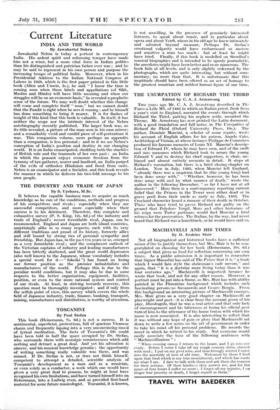MACHIAVELLI AND HIS TIMES
By D. Erskine Muir
Not all biographical and historical books have a sufficient raison d'etre to justify themselves, but Mrs. Muir is to be con- gratulated on choosing for her book (Heinemann, 10s. 6d.) a subject that gives us food for reflection concerning our own times. As a public admission it is important to remember that Signor Mussolini has said of The Prince that it is " a book which I would fain style the statesman's rade mecum," and again, that." it is a doctrine more living today than it was four centuries ago." Machiavelli is important because he wrote that book, and not for any other reason. However, a portrait must be put into a frame, so Mrs. Muir has with ability painted in the Florentine background which includes such fascinating persons 'as Savanarola. and Cesare Borgia. From this background an interesting picture of Machiavelli emerges. Mrs. Muir gives us a very good chapter on Machiavelli as playwright and poet—it is clear from the account given of his play, Mandragola, that he was a real artist and that only lack of encouragement and his bitterness at losing his official post turned him to the utterance of the home truths with which his name is now associated. It is also interesting to reflect that it was without any hope of gain or glory that Machiavelli sat down to write a few notes on the art of government in order to take his mind off his personal problems. He records the mood in which he retired to his study. Not everyone would easily associate the tone of the following sentences with " Machiavellianism " : " When evening comes I return to the house, and I go into my study. Before I enter I take off my rough country dress, stained with mud ; I put on my good robe, and thus fittingly attired I enter into the assembly of men of old time. Welcomed by them I feed upon that food which is my true nourishment, and which has made me what I am. I dare to talk with them and ask them the reasons for their actions. Of their kindness they answer me, and for the space of four hours I suffer no more ; I forget all my injuries, I no longer fear poverty or death, I forget myself in them."
TRAVEL WITH BAEDEKER






































 Previous page
Previous page